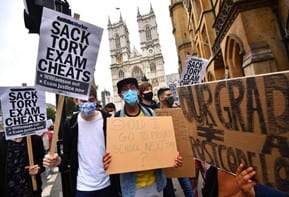‘Levelling-Up’ or ‘Levelling-Down’?

There were smiles galore this year at the Conservative Party conference; applause arose all around the hall as an inelegant Caesar stomped his way to stage. Love him or loath him, it is Boris Johnson; the man that failed to get himself from one end of a zipline to another, tasked with leading the UK into a new post-pandemic age. With “GETTING ON WITH THE JOB” smeared across his backdrop, it was not too difficult to work out that the centrepiece of the Prime Minister’s discourse this year was the ‘Levelling-Up’ agenda. What remains all too interesting, however, is how little we actually know about what this means or what it entails. The first part of this blog will therefore attempt to piece together what has been said, in order to understand what a ‘Levelled-Up’ society could look like. Education and skills were (rightly so) focal points in Johnson’s speech, as he touched upon a success story of school from East London and took time to announce a £3,000 teacher premium. Part two of this blog will consequently examine the contentious nature of our current Department for Education and argue that Johnson’s investment plans do very little to tackle structural and systematic disparity between kids from varying economic and regional backgrounds. The final part will identify and recommend 3 supporting avenues of investment, which would ‘Level-Up’ plans and target major issues facing not only British schools, but society as a whole.
Part I.
What is Levelling-Up?
Let’s be honest, ‘Build-Back-Better’ is nothing more than a catchy piece of alliteration which seamlessly slides off the tongue and sounds even better when it is said in Johnson’s deep, populist conviction, along with a wagging of his finger. Political sloganism aside, what do we actually know about the ‘Levelling-Up’ agenda? According to the government, ‘Levelling-Up’ refers to the long-term plan to confront social inequality spread across the UK, particularly in relation to the infamous North-South divide. Labelled as a “defining” mission of this government; one thing cannot be disputed, and that is the magnitude of the task at hand. The Institute for Fiscal Studies published that the UK in 2021 has greater levels of inequity between regions compared to any other comparable nation. It remains an unfortunate fact of life that Northern regions continue to lag behind the South with regards to health, wealth, education, and transport. According to The Equality Trust, the average household income in the South-East sits comfortably at £387,000, while in the North-East it is £96,000. Every single neighbourhood listed in the most deprived areas of the UK is located in the North. People live for longer in the South, and the prospects of Southern children receiving an A-grade at A-level is significantly higher. This is not to say that Southern achievement should devalued, nor should we think that deprivation does not exist in the South. The whole point of ‘Levelling-Up’ is to deploy targeted investment across the whole country. This will include disadvantaged cities and towns, as well as coastal and rural regions, found in the North and South. To ‘Level-Up’ the UK is to achieve something that has never truly be done in this country. Namely, reducing the sheer amount of power and funding hoarded in Whitehall. Pledges such as setting up a second housing department in Wolverhampton and relocating 22,000 civil servants out of London will not be forgotten. There is much to be said about politicians saying things but not actually doing them. Also, just because it has not been done before does not mean that no one has ever tried. In recent memory, we have witnessed the likes of David Cameron present to us an analogous scheme termed ‘Northern Powerhouse’, which sought to encourage economic growth in the North of England. Unlike his predecessor, however, Johnson has positioned the ‘Levelling-Up’ agenda as his flagship policy, which has gained traction coming out of lockdown. This year, the Ministry of Housing, Communities, and Local Government was rebranded to the Department for Levelling-Up, Housing, and Communities, and headed-up by the ever-incompetent Michael Gove.
“We are at last experiencing a new empire, an empire where the happy south stamps over the cruel, dirty, toothless face of the northerner. At last Mrs Thatcher is saying I don’t give a fig for what half the population is saying, because the richer half will keep me in power. This may be amoral, this may be immoral, but it’s politics and it’s pragmatism”
- Gove (Cambridge Union Address 1987).
“Can I also say that Lucy (Fraser) has done remarkably well, coming as she has done from the back streets of the slums of Leeds. You can still see something of the poverty there”
- Gove on Lucy Frazer, Union President, and future Conservative Cabinet Minister (Cambridge Union Address 1993).
These are words of the bloke whose job it is to oversee the fundamental task at hand. Many communities for too long have been undervalued and deprioritised by government ministers such as this one. Gove is a dreadful fit if you ask me, but then again, I am merely a cruel, dirty, and toothless northerner.
Part II.
The Worst Education Secretary of All Time.
During his conference speech, the Prime Minister emphasised the achievement of Brampton Manor; a school situated in one of the most disadvantaged boroughs of London, but this year sent more children to Oxbridge than Eton. Rather than congratulating students and staff on their outstanding performance, Johnson credited Brampton’s success to his government’s ‘Levelling-Up’ plan – a complete and downright load of rubbish. I wish to make one thing very clear: the teachers and their pupils at Brampton Manor deserve all the praise in the world, and this is by no means a discrediting of their achievement. What I do take issue with, however, is the government’s grotesque arrogance taking undue acclaim for something they had so little involvement in. Boris Johnson and his government have treated schools with utter contempt during these pandemic years, having provided imprecise guidance on remote learning and abandoning households who lacked the necessary technology for online teaching. Squawking from his snooty perch, Gavin Williamson not only scapegoated students whenever his schemes produced a rise in COVID cases, but he also neglected the whole existence of early years. Carers and teachers were for the most part left in the dark, making their own decisions on setting up classes, and ensuring the continuity of a child’s development. If it was not for the hard work and determination of those looking after our children, education as a whole certainly would have levelled down during this pandemic.

The epitome of the government’s ineptitude can be seen in the 2020 A-Level unnecessary results fiasco. Rather than trusting teacher judgement, Williamson oversaw the mass downgrading of 39.1% of marks, through placing obscene faith in a soulless algorithm. It may seem that I write about such disaster with a trace of personal bitterness. In truth, I am 19 year old student who was downgraded in every A-Level I was handed. As a result, I was rejected by each and every one of my university options. My results had fallen from A*AA to ABB. Remarkably, it has since been discovered that said algorithm inflated the number of As and A*s achieved in private schools by 4.7%. Undoubtedly, however, chaos was felt across all forms of school, as I had a friend at the time who attended private school and was still downgraded by a total of 5 grades. It is symbolic that when the government scrapped the algorithm and placed trust in the hands of teachers this year, schools such as Brampton Manor emerged with notable success. Brampton’s success derives from the drive put in by staff and students on a daily basis. Pupils are inspired by teachers, not by the baseless words and faulty direction given by our politicians.
A closer inspection of the statistics used by Johnson is also very revealing. Correct Brampton sent 7 more students to Oxbridge compared to Eton in 2020. But this just coats over the fact that 48 students still got accepted onto a course from Eton, down from 69 acceptances in 2020. Johnson also missed out that the top ten schools with the highest proportion of Oxbridge offers were highly-selective academies, concentrated in and around London. Similar studies have shown that between 2018 and 2020, only 170 students were admitted to Oxford from North-East regions, compared to over 1,900 acceptances in the South-East of England. Absolutely nothing has ‘Levelled-Up’ here. The government has no right to accredit itself for Brampton’s success, nor should it even concern itself with success upon examination of these wider figures. Social and regional inequality remains rife in our schools; every year a great number of bright minds will be denied places onto courses for reasons beyond their reach. Privilege bodes well beyond university too, particularly in the legal and administrative sector. Over 70% of judges and almost 30% of MPs are privately educated. One school’s success is not illustrative of basal change in education. Our very own Prime Minister is a Hall of Famer in the Bullingdon Club, and we should not be fooled by him. British schooling is still governed by the elite for the elite.
Set alongside Brampton’s success, Johnson also announced a £3,000 ‘Levelling-up’ bonus to encourage teachers of maths, science, and computing to enter schools in deprived areas of the country. The subjects chosen reflect industries with the biggest supply challenges. There is no outline as to when the premium is set to come into effect, however, it was also said that it would come together with a £14bn package for British education. The latter will supposedly involve lifting the starting salary of a teacher to £30,000. I admit that this is not the worst idea the government has ever had, nevertheless I stress over what actually will receive investment, aside from teacher pay. While I invite an uplift to the salaries of those who teach us while we are young, it is the wrong approach to encourage teaching through merely remuneration adjustments. The delivery of education is almost an artform, and it should not be dealt with in business terms. Teachers are conductors and it is their pupils who form a symphony orchestra. Increasing teacher pay should not be a means of improving the quality of education. The focus instead should also be on infrastructure and reimagining teacher training in aid of modernising education. Many British schools have received little renovation and now stand as rundown structures. It is the duty of government to provide the environment and conditions through which youthful minds can explore themselves and come up with weird and wonderful ideas. One light bulb moment in a British school could impact the entire course of history to come for the better. As Margaret Mead once said, ‘Never doubt that a small group of thoughtful, committed citizens can change the world; indeed, it’s the only thing that ever has’. Any child, regardless of their family’s finances or home circumstances, should have access to fair and equal education. They should be able to shape their own future and they should do so in properly-funded schools. Amongst all this, teachers are not pecuniary pawns, and therefore they should not be treated as so.
Part III
Final Recommendations.
Alongside an uplift to teacher pay and general infrastructure development, I recommend 3 possible avenues for the government to explore with regards to present and future spending in education.
- Take mental health seriously.
Coming out of lockdown, it has become clearer that mental health support and awareness in British schools is inadequate. Recent studies have found that 1 in 5 suffer from a mental health issue in school, which is well over 500,000 students.
The time has come for education spending to target the mental health subdivisions of our schools. Funds should be dedicated to train and appoint counsellors who are properly resourced to deal with the needs prevalent across their given school. A strong open-door policy must be adopted for this to work. Studies show that early detection and intervention is effective.
- Wholesale curriculum reform and digitalisation
Think about how much you have learnt since leaving school. Today’s curriculum is not aligned with the right modern issues; therefore it is no surprise that some children grow up with ill-informed views attitudes. Black history is criminally underappreciated in the UK. For instance, a report published by the University of Liverpool in 2019 found that only 4% of GCSE history students studied the “migration to Britain” module available by OCR and AQA exam boards. Erasing history can have such a detrimental effect on someone’s sense of identity in their own country. The modern classroom discussion should be on relevant issues from a broad spectrum of histories, not simply a system oozing of white privilege.
Furthermore, schools must be well-equipped as the world outside the classroom becomes increasingly digitalised. As noted, the pandemic has shown that not every student has access to technology. It is the government’s responsibility to look into this and ensure that moving forward schools are outfitted with the relevant technologies to deliver effective education.
- ‘Hybrid teaching’
What I mean by ‘hybrid’ teaching is reimagining the way in which we perceive our final years in education, namely post-GCSE and sixth form. Current schooling characterises itself too much as a steppingstone for academia, whereas in reality we should be placing just as much emphasis on those pursuing vocational specialisms.
The government should invest heavily in setting up a range of schemes available to those who do not wish to go to university. Critically, I am solely referring to the many who feel university life is not for them, not those who wish to go but for any number of reasons, such as finances, they do not apply. Hybrid teaching allows for students to hear from a whole range of options when they are looking beyond their final exams. Vocational officers could be trained and appointed, perhaps even some vocational courses could be introduced as curriculum.
Social and regional inequality will not be solved exclusively by following the above 3 avenues. However, they are most definitely good starting points in order to ‘Level-Up’ our society from early years onwards. Giving care and attention to the intricacies of educational reform, rather than simply chucking money at it, is the way forward. Brampton Manor is a success story, but there are many more children across the country who fall victim to the British education system. This is largely due to regional disparity in levels of investment, but it also is illustrative of a culture clash between those who pay for education and those who cannot afford it. Vocational specialism is just as important as scholarly academia, and the quicker we fully appreciate this in schools, the quicker we can make school worthwhile for those children who feel lost amongst the books. It only at this point that we will begin to ‘Level-Up’.
Conceivably, I am being too idealistic, and my toothless words will not hold-up amongst the harsh realities of the real world. Then again, as any other child would, one can only dream.
Bradley Young: Undergraduate student at the London School of Economics and Political Science.
All blogs represent the views solely of the named author, and not those of the Fabian Education Policy Group or the wider Fabian Society”

